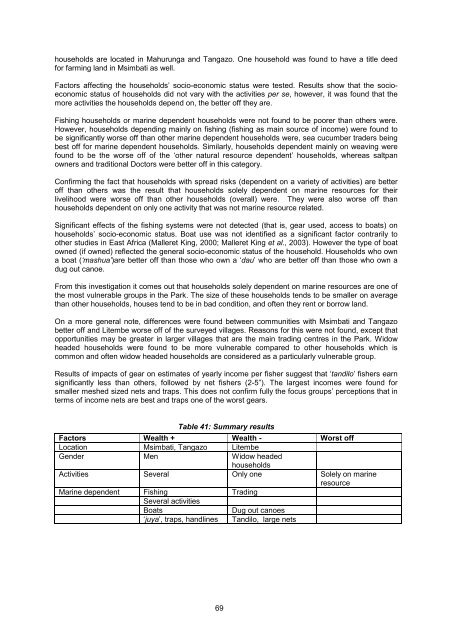a socio-economic baseline assessment of the mnazi bay - IUCN
a socio-economic baseline assessment of the mnazi bay - IUCN
a socio-economic baseline assessment of the mnazi bay - IUCN
Create successful ePaper yourself
Turn your PDF publications into a flip-book with our unique Google optimized e-Paper software.
households are located in Mahurunga and Tangazo. One household was found to have a title deed<br />
for farming land in Msimbati as well.<br />
Factors affecting <strong>the</strong> households’ <strong>socio</strong>-<strong>economic</strong> status were tested. Results show that <strong>the</strong> <strong>socio</strong><strong>economic</strong><br />
status <strong>of</strong> households did not vary with <strong>the</strong> activities per se, however, it was found that <strong>the</strong><br />
more activities <strong>the</strong> households depend on, <strong>the</strong> better <strong>of</strong>f <strong>the</strong>y are.<br />
Fishing households or marine dependent households were not found to be poorer than o<strong>the</strong>rs were.<br />
However, households depending mainly on fishing (fishing as main source <strong>of</strong> income) were found to<br />
be significantly worse <strong>of</strong>f than o<strong>the</strong>r marine dependent households were, sea cucumber traders being<br />
best <strong>of</strong>f for marine dependent households. Similarly, households dependent mainly on weaving were<br />
found to be <strong>the</strong> worse <strong>of</strong>f <strong>of</strong> <strong>the</strong> ‘o<strong>the</strong>r natural resource dependent’ households, whereas saltpan<br />
owners and traditional Doctors were better <strong>of</strong>f in this category.<br />
Confirming <strong>the</strong> fact that households with spread risks (dependent on a variety <strong>of</strong> activities) are better<br />
<strong>of</strong>f than o<strong>the</strong>rs was <strong>the</strong> result that households solely dependent on marine resources for <strong>the</strong>ir<br />
livelihood were worse <strong>of</strong>f than o<strong>the</strong>r households (overall) were. They were also worse <strong>of</strong>f than<br />
households dependent on only one activity that was not marine resource related.<br />
Significant effects <strong>of</strong> <strong>the</strong> fishing systems were not detected (that is, gear used, access to boats) on<br />
households’ <strong>socio</strong>-<strong>economic</strong> status. Boat use was not identified as a significant factor contrarily to<br />
o<strong>the</strong>r studies in East Africa (Malleret King, 2000; Malleret King et al., 2003). However <strong>the</strong> type <strong>of</strong> boat<br />
owned (if owned) reflected <strong>the</strong> general <strong>socio</strong>-<strong>economic</strong> status <strong>of</strong> <strong>the</strong> household. Households who own<br />
a boat (‘mashua’)are better <strong>of</strong>f than those who own a ‘dau’ who are better <strong>of</strong>f than those who own a<br />
dug out canoe.<br />
From this investigation it comes out that households solely dependent on marine resources are one <strong>of</strong><br />
<strong>the</strong> most vulnerable groups in <strong>the</strong> Park. The size <strong>of</strong> <strong>the</strong>se households tends to be smaller on average<br />
than o<strong>the</strong>r households, houses tend to be in bad condition, and <strong>of</strong>ten <strong>the</strong>y rent or borrow land.<br />
On a more general note, differences were found between communities with Msimbati and Tangazo<br />
better <strong>of</strong>f and Litembe worse <strong>of</strong>f <strong>of</strong> <strong>the</strong> surveyed villages. Reasons for this were not found, except that<br />
opportunities may be greater in larger villages that are <strong>the</strong> main trading centres in <strong>the</strong> Park. Widow<br />
headed households were found to be more vulnerable compared to o<strong>the</strong>r households which is<br />
common and <strong>of</strong>ten widow headed households are considered as a particularly vulnerable group.<br />
Results <strong>of</strong> impacts <strong>of</strong> gear on estimates <strong>of</strong> yearly income per fisher suggest that ‘tandilo’ fishers earn<br />
significantly less than o<strong>the</strong>rs, followed by net fishers (2-5”). The largest incomes were found for<br />
smaller meshed sized nets and traps. This does not confirm fully <strong>the</strong> focus groups’ perceptions that in<br />
terms <strong>of</strong> income nets are best and traps one <strong>of</strong> <strong>the</strong> worst gears.<br />
Table 41: Summary results<br />
Factors Wealth + Wealth - Worst <strong>of</strong>f<br />
Location Msimbati, Tangazo Litembe<br />
Gender Men Widow headed<br />
households<br />
Activities Several Only one Solely on marine<br />
resource<br />
Marine dependent Fishing Trading<br />
Several activities<br />
Boats<br />
Dug out canoes<br />
‘juya’, traps, handlines Tandilo, large nets<br />
69
















